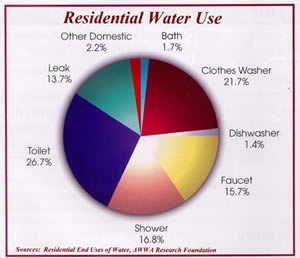Water Conservation Tips for Home

Indoor Water-Saving Tips
- Install water-saving shower heads or flow restrictors. You can pick up inexpensive, easy to install devices from your local hardware or plumbing store. Check out the Water Wiser web site to find out more about water saving devices, http://www.waterwiser.org.
- Check your toilets for leaks. Drop a little food coloring or leak tablet into your toilet tank. Wait a few minutes. If color shows up in your bowl, you have a leak. A leaking toilet wastes up to 200 gallons of water per day. To learn more about toilet repairs head to the Toiletology web site where you can find in depth toilet repair instructions. http://www.toiletology.com/index.shtml
- Reuse water from your fish tank. Water from the fish tank is full of nitrogen and phosphorus, to fertilize/water your plants.
- Insulate hot water pipes. Insulating water pipes reduces energy cost as well as saves water.
- Turn off the faucet flow while brushing your teeth, shaving, or lathering your hands.
- Make sure the faucet is fully turned off. Even small drips can waste significant amounts of water. Hot water drips are a waste of both water and energy used to heat the water.
- Take shorter showers. Try to time your shower to keep it under 5 minutes.
- Use washing machines and dishwashers only when they are full, which can save as much as 1000 gallons of water a month.
- Do not let water run when washing dishes by hand. If possible fill one sink for washing and the other for rinsing.
- Store drinking water in a refrigerator or other container rather than running on the tap each time you want a drink.
- Wash food and produce in a partially filled sink instead of running water.
- Reuse water to water houseplants.
- Use water-efficient showerheads to save water.
- When shopping look for water and energy-efficient appliances, preferably Energy Star rated.
- Do not use running water to thaw frozen foods.
- Soak pots and pans before cleaning.
Outdoor Water-Saving Tips
- Be sure to track your water usage by checking your water meter and bill regularly.
- Watering your yard or garden in the early morning reduces evaporation.
- A layer of organic mulch reduces evaporation and saves hundreds of gallons of water per year.
- Sweep instead of hosing down your driveway.
- Check outdoor faucets, pipes and hoses for leaks.
- Water your lawn only when needed.
- Mow your lawn at a higher setting—closely clipped grass reduces soil moisture and requires more frequent watering.
- Direct downspout runoff toward your garden or shrubbery.
- Do not water on windy days.
- Know where your master water shut-off valve is located for emergencies.
- Weed your garden and lawn regularly to prevent water waste.
- Fertilizers increase water consumption, so use sparingly.
- Choose low water use plants for your garden.
- Check your pool for lost water, no more than ¼ inch per day. A pool cover will slow the rate of evaporation.
- Wash your car on the grass or try a commercial car wash that recycles water.
- Bathe pets outdoors where your lawn needs water the most.
- Aerate your lawn to increase water absorption.

